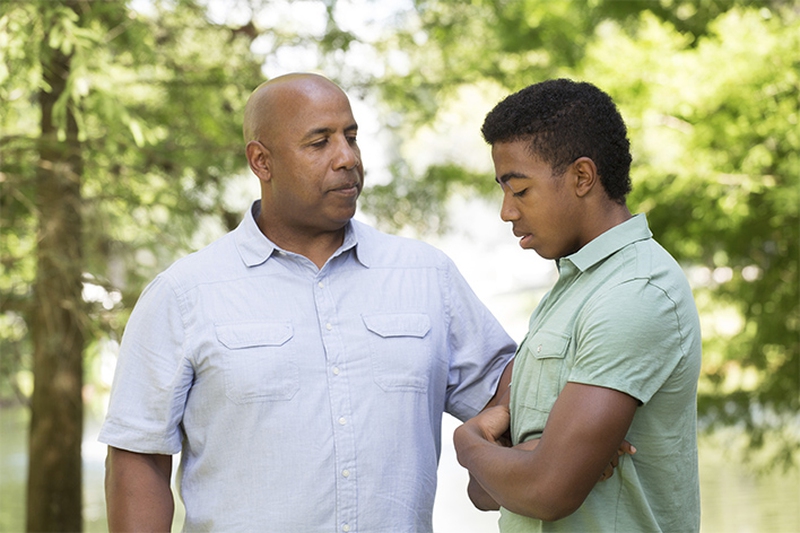If someone in your life is having trouble controlling anger, their unpredictable and sudden rages of anger can be frightening and, in some cases, unforgettable and damaging to your relationships. While you may greatly care for this person, their inability to control their anger may have a deleterious impact on your relationship. Preserving your relationship with the person and addressing the person’s anger control problems at the same time is challenging and requires tact. But you can succeed with the right method.

How to Help Someone with Anger Issues
Never take it personally
One method to help someone with anger issues is to disengage from the angry discussion. Avoid getting upset and do not take their anger outburst personally. A majority of people who have difficulty controlling their anger will blame the person(s) closest to them; however, their anger often stems from insecurity, issues during their upbringing, their personality, past experiences, feeling of being hurt, unloved, or unappreciated.
Many people with anger issues perceive themselves to be victims. The malicious and hurtful things said during a raging episode are rarely factual, and emotionally driven. Attempting to rationally discuss and resolve the issue at hand with a person with anger management issues while they are raging with anger is futile.
Once an argument begins to escalate, you can help someone with anger issues by simply leaving the room. This not only gives them time to cool down but also protects you from being hurt emotionally and physically.
Keep it focused
Often times, a person with anger control issues becomes physically or emotionally abusive to protect their ego and their low self-esteem. The angry person often has an inflated ego and a narcissistic personality, who is overly sensitive to the slightest criticisms or wishes of others that conflict with their own wishes. Often times, the angry person will digress and bring up negative issues from the past.
One way to help someone with anger issues is to keep the discussion focused on the issue at hand. First, allow the angry person to verbalize their anger and feelings. Second, avoid discussing past issues, but center the discussion on the current issue. This will help avoid a “domino effect” in which all negative events from the past are brought up.
Many times the angry person can focus only upon their own needs and is unlikely to hear you or engage in a focused discussion. In this case, disengaging from the angry person is the best option.
Stay Calm
Angry people are often reality distorters who blame others for their anger outburst and also deny having anger issues. An angry person is looking for a reaction and ultimately a fight with you. They often say emotionally hurtful and provocative things to “push your buttons” to lure you into a fight.
So how to help someone with anger issues in this case? Just don't engage in the anger battle. Despite their yelling or insults, you should remain calm and speak in a calm tone. Try to say as little as possible. If they come close to you physically, increase the distance between the two of you. This will help you gain control of the situation.
Let the angry person know you've heard it
Let the angry person know that you can understand their angry feelings and know where this anger comes from. For example, rather than saying, “I can see that you are angry right now”, say “I understand that you are angry because I did not empty the dishwasher”. The latter indicates active listening and empathy. You can also state, “I am hearing that you are angry because I did not empty the dishwasher. Is this correct?” This often calms the angry person down by making him or her feel that you've heard and understood all the things.
Navigate the conversation to a productive direction
One crucial step in finding out how to help someone with anger issues involves directing the conversation to a productive direction. Disregard the ranting and berating of an angry person. Instead, ask the angry person how you can help. If it is something that you can't or won't help with, simply tell the person you are sorry but you cannot help.
You may want to add that you are available to lend an ear to them whenever needed. Usually, the anger is the expression of being hurt or a big disappointment, and what the angry person need is to vent all the negative feeling furiously. In this case, being a good listener can really move things forward.
Assuming they are doing their best
Help someone with anger issues by reframing your thought pattern. This means that you should tell yourself that the angry person may have had a difficult day, or be in a bad mood due to some external factor. In turn, this will help you remain calm and prevent you from becoming defensive and reactive. This is not easy, especially when the person is raging and berating you. However, taking the higher road will likely result in a better outcome.
Take care of yourself
Many times you deserve and should put yourself first. This is a must in learning how to help someone with anger issues. When you are trying to help an angry person but can't find a solution, you may begin to feel defeated, start to believe that you deserve the criticisms and tirade from the angry person, and even become fearful of the angry person. So take good care of yourself and even keep distance with this angry people to protect yourself and preserve your energy to help them in the future.
Besides, you should live a healthy and happy life, like eating well, exercising regularly, hanging out with friends. If you feel that the angry person is affecting you greatly and negatively, you should talk to some trust-worthy friend or even resort to a therapist or support group.
Try Exercise
Take a time out to exercise. Even a slow jog or brisk walk on the treadmill or around the neighborhood can alleviate frustration and subsequently enable you to approach a tense situation with a calmer disposition. The therapeutic effects of exercise include lowering blood pressure and releasing endorphins which is helpful in improving mood.
Try to avoid focusing on your frustrations or anger as you exercise, instead pay attention to how your body rhythm and how it feels as you move. When you feel angry before you enter a situation or see a person, exercising strenuously beforehand may help you remain calm.
Humor helps
We have all heard the saying, “Laughter is the best medicine”. How to help someone with anger issues includes trying to levitate the mood with humor. Do not make fun of the angry person. Instead, direct the humor at yourself or the situation. Humor tends to work in close relationships, but if the angry individual becomes more agitated, abandon this technique.
If you feel physically threatened or scared, leave the environment. If you feel yourself getting angry or frustrated with the person who's having an angry outburst, take a walk around the block or take a drive. This will give you and the angry person time to calm down.
Seek professional help
This is imperative if the person is verbally, emotionally, or physically abusive. If the person is physically abusive, you should move to a different location until the angry person receives counseling.
Seek professional help for anger management if:
The person still has anger outbursts, even after trying all the aforementioned techniques.
The anger outbursts cause conflicts in your relationships and at your work place.
The person avoids socializing for fear of losing self-control and flying into a temper.
You have to take legal action(s) against the person as a result of their actions while angry.
The person is/becomes physically abusive in some way.











View All Comments /Add Comment